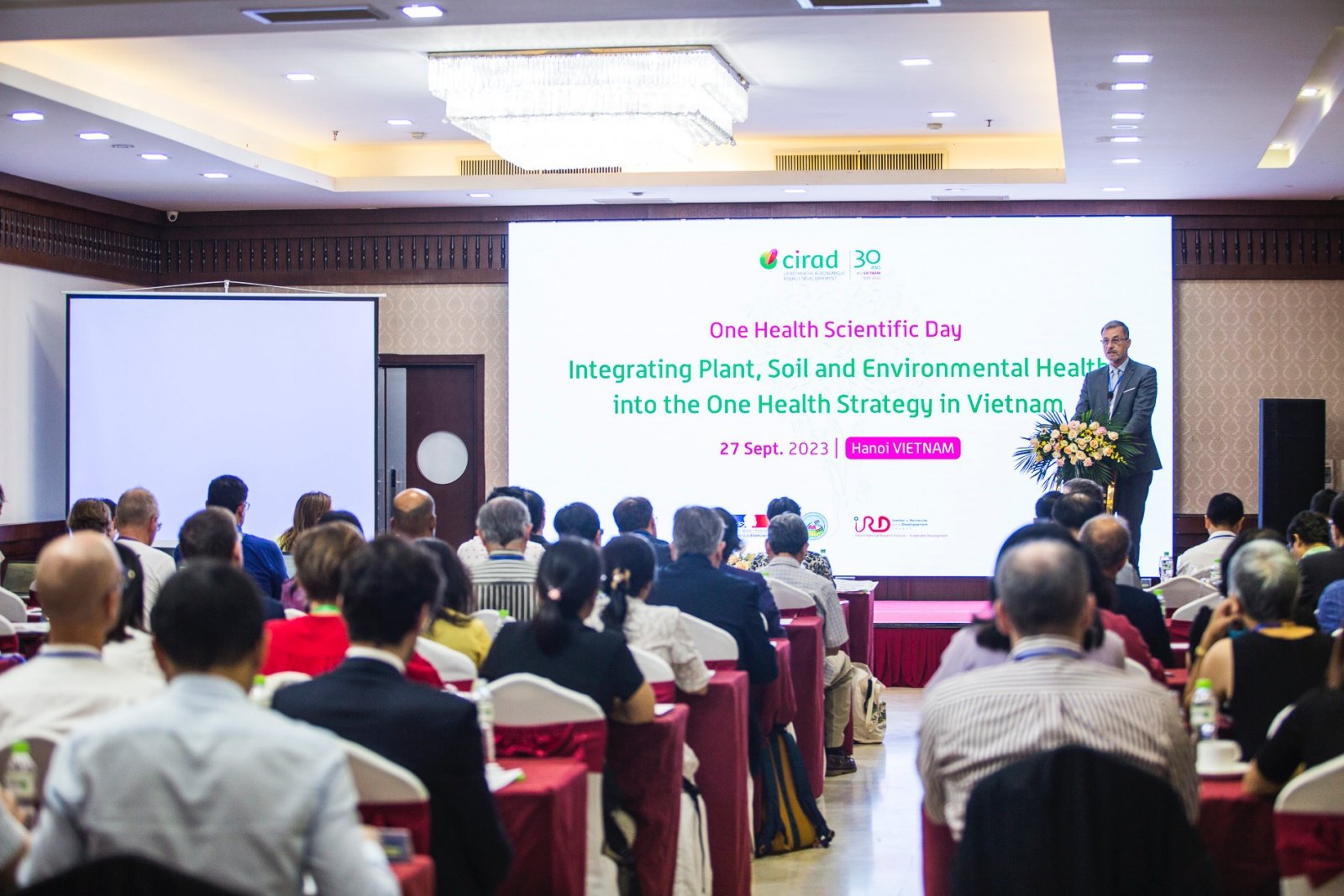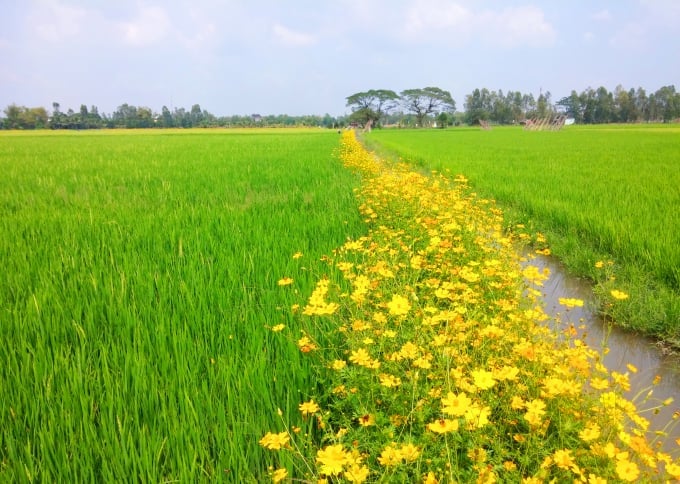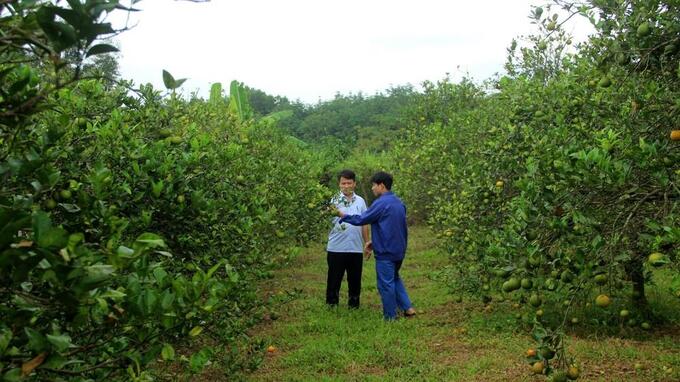May 24, 2025 | 16:19 GMT +7
May 24, 2025 | 16:19 GMT +7
Hotline: 0913.378.918
May 24, 2025 | 16:19 GMT +7
Hotline: 0913.378.918
A One Health Scientific Day: “Integrating Plant, Soil and Environmental Health into the One Health Strategy in Vietnam was organized on 27 September in Hanoi, Vietnam, by Vietnam Academy of Agricultural Sciences (VAAS), French Agricultural Research Centre for International Development (CIRAD) and Institut de Recherche pour le Développement - National Research Institute for Sustainable Development (IRD), under the patronage of the French Embassy in Vietnam.

This event is part of the 50th anniversary of diplomatic relations between Vietnam and France, as well as the 30th anniversary of CIRAD in Vietnam. Photo: Hong Tham.
French Ambassador to Vietnam H.E. Olivier Brochet and Ms. Elisabeth Claverie de Saint Martin, President and CEO of CIRAD co-chaired this event.
This scientific event brings together scientists and experts from various fields of study to investigate the concept of “One Health” and to emphasize the intricate connections among various aspects of health, encompassing the well-being of plants, vitality of soil, and overall environmental health.
More than 80 scientists and experts from various international organizations such as VAAS, Centre for Agriculture and Bioscience International (CABI), International Livestock Research Institute (ILRI under CGIAR), IRD, CIRAD, Wildlife Conservation Society (WCS), Association Wildlife Conservation Society (WCS), Food and Agriculture Organization of the United Nations (FAO), International Union for Conservation of Nature (IUCN), and many other organizations attended this scientific day.
The day will provide an opportunity to focus on this critical concept, which is supported by all French operators and their Vietnamese partners, as well as provide an overview of initiatives such as PREZODE (Preventing Zoonotic Disease Emergence) and the launch this year of the new French One Health Institute, which aims to provide training and expertise to decision-makers.
The objective of this event is to disseminate about new insights to the “One Health” approach, which recognizes the interdependence of human, animal, and environmental health, is critical for dealing with complex global issues like zoonotic infections, antibiotic resistance, and ecosystem disruption.
Historically, the significance of soil health and plant health has not been recognized as integral elements within the "One Health" framework. This framework primarily emphasizes the interdependencies among human health, animal health, and the environment, encompassing wildlife and ecosystems. However, there is growing understanding of their significance and connection to the general wellbeing of ecosystems and communities, as well as their part in preserving food security and the wellbeing of people and animals.
The following 4 topics were covered during this scientific day:
- Plant Health: Plant health is critical for food security, but the spread of exotic microorganisms and pests as a result of climate change is disrupting harvests, potentially leading to famine in some countries. Some agricultural techniques used to preserve food quality can have undeniable negative consequences for the consumer. Such is the case with phytopharmaceutical and pharmaceutical residues. Alternative solutions, such as biocontrol using natural means, are available, but must be evaluated and promoted.

The integrated crop health management program (IPHM) is being implemented by Vietnam's agricultural sector. Photo: Le Hoang Vu.
- Soil Health: Soils are critical to crop production and human activities, and they play an important role in the organization of terrestrial ecosystems. Many factors compromise their functions and services, including urbanization, chronic, diffuse, or accidental pollution, compaction, erosion, fertility loss, biodiversity loss, organic matter loss, and salinization.
Sustainable soil management requires a better understanding of soils, control over their artificialization, utilization of their biological potential, improved cultivation practices, research into soil-plant-microorganism interactions, territorial soil governance structuring, and regulatory measure adaptation.
- Ecosystem Health: Healthy soils and plants are essential components of ecosystems, which play an important role in supporting biodiversity, regulating water cycles, and providing ecosystem services that have an impact on human health both directly and indirectly.

Protecting the ecosystem plays a particularly important role in maintaining a sustainable agriculture.
- Wildlife and biodiversity conservation: Wildlife conservation is a philosophy that aims to manage wildlife populations and their environments in a way that does not deplete, exhaust, or extinguish species or their habitats. Furthermore, wildlife conservation is a coherent ethic of resource use, allocation, and protection, rather than a disparate set of policies, practices, and supporting science. The utilization of natural resources and the preservation of biodiversity offer numerous advantages in terms of promoting human health and mitigating the transmission of infectious diseases.
This event is part of the 50th anniversary of diplomatic relations between Vietnam and France, as well as the 30th anniversary of CIRAD in Vietnam. This is a typical activity of sharing knowledge and partnerships with practical value in the process of sustainable development for Vietnam agriculture.
Translated by Hong Tham

(VAN) In the tranquil wetlands of Van Long, there are quiet souls who guard the forests, nurture the waters, and oversee every bird and troop of langurs as protecting the essence of a living heritage.

(VAN) WWF, GIZ, IUCN, UNDP call for biodiversity conservation and sustainable development must be regarded as a unity in strategies for a green future.

(VAN) On celebration of International Day for Biological Diversity, Deputy Minister Nguyen Quoc Tri called for practical actions to address nature and biodiversity conservation.

(VAN) Dr. Hoang Thi Thanh Nhan – Deputy Director of the Nature and Biodiversity Conservation Agency – highlighted this on the International Day for Biological Diversity, May 22, 2025.
![Ho Chi Minh city adapts to climate change: [2] Accelerating action](https://t.ex-cdn.com/nongnghiepmoitruong.vn/608w/files/chiqk/2025/05/22/4024-4220-bien-doi-khi-hau-1-100626_766.jpg)
(VAN) Clearly recognizing the challenges posed by climate change, Ho Chi Minh city has swiftly shaped its policies and implemented practical solutions to adapt.

(VAN) Rice straw is no longer just a discarded byproduct, but it is becoming a green resource that helps farmers in the Mekong Delta reduce emissions and promote circular, sustainable agriculture.

(VAN) Other Effective Area-based Conservation Measures (OECMs) are solutions that contribute effectively to achieving the goals of the Kunming–Montreal Global Biodiversity Framework.